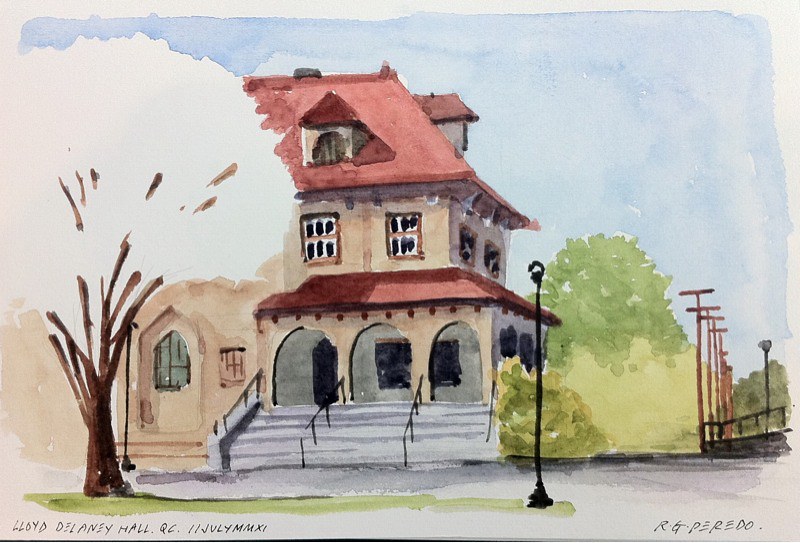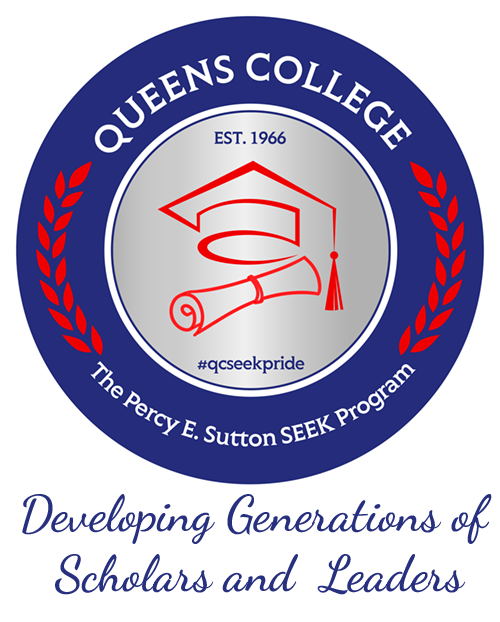Queens College Seek History

The Percy E. Sutton Search for Education, Elevation and Knowledge (SEEK) Program was born out of the Civil Rights Movement and signed into law in 1966 by the New York State legislature as the higher education opportunity program for senior colleges in the City University of New York (CUNY). This legislation, Education Law 6452, was a result of the efforts of some of New York’s established activists and progressive politicians; Percy Ellis Sutton, Shirley Chisholm, Charles B. Rangel, Basil A. Paterson, David Dinkins and Allen B. Ballard. Shirley Chisholm, the first African American woman from Brooklyn elected to the New York State Assembly often said that her greatest political contribution was getting the SEEK Program into law. Their collective vision was to provide access to CUNY for economically disadvantaged students who graduated from high schools that had not prepared them for the rigors of college.The program became vital to making CUNY more representative of New York City, bringing in African American, Latino, working-class and immigrant students and supporting them in college studies – a role it continues today. Former New York Mayor David Dinkins, who worked in Albany…. on the SEEK legislation, credits Chisholm and Sutton with pushing it through.[1]
Queens College, Brooklyn and City College were part of the original cohort. Today, there are eleven SEEK Programs across CUNY with College Discovery (CD) as their sister program in two-year colleges. With the success of SEEK other opportunity programs were established in partnership with New York State, The Arthur Eve Higher Education Opportunity Program (HEOP) in 1969 at independent colleges, and the Education Opportunity Program (EOP) in 1970 for state colleges. Most recently in CUNY, Accelerate, Complete, Engage (ACE) in 2015 began as a spin-off the success of the Accelerate Study in Associate Program (ASAP) started in 2007 as a support program that utilizes elements of the SEEK model, but does not have an income requirement for admission.
Institutional Commitment:
The initial years of the SEEK Program on the Queens College Campus were turbulent. The College’s Administration perceived SEEK as one of CUNY’s political impositions. Added to already existing racial and social tensions in the country, the relationship between program and college was tense.
In 1969, the Queens College SEEK population was almost exclusively Black and Puerto Rican, but its teaching and administrative staff were almost entirely white. Informed by political ideologies of leaders like Malcolm X and organizations such as the Black Panthers and Young Lords, these students banded together to fight for autonomy over the curriculum and personnel of the SEEK program.[2]
Historical records show that SEEK Students, Faculty and Staff fought for what they called, “self-determination”, demanding the right to have a say in how the program was managed and how students were educated.
The SEEK activists won several of their demands, starting with the appointment of the first African American director. With increased autonomy, SEEK’s personnel and curriculum diversified, and Queens College SEEK became a truly innovative and representative educational program.[3]
Hired to teach and work in the program were recent graduates from Historically Black Colleges and Universities (HBCU’s), African and Puerto Rican nationalists, progressive Jews, and Caribbean pedagogues. They were young assertive creatives, who infused their devotion to social activism, ethnic pride, and global awareness in the program. Under their influence SEEK’s activism increased as the program demanded more institutional commitment.
The most outstanding requests included:
- Adequate space. In the 70’s over 2,000 students were housed in two temporary structures on campus. During warmer months some faculty held classes on sidewalks. They remained in these structures for 25 years.
- Daycare service. As a great number of students, at the time, were parents. SEEK Counselors started the Day Care Service that become the first service of its kind in CUNY and the second in the nation.
- A diversified curriculum. One that included the histories and stories of people of color, in particular for social sciences and English course work.
- The development of holistic structures. Supportive guidance that would allow students to receive dedicated college advisement which included personal counseling. Academic support with imbedded, untimed and dedicated teams of tutors who were peers and staff, who could relate to and understood students’ backgrounds and needs.
The arc of institutional support bent slowly towards commitment. In 1991 Queens College assigned the SEEK Program its own physical space in the then “D Building”. A commemoration ceremony and renaming of the three-story structure, to The Lloyd Delany Hall, after the first SEEK Director of color, took place in 1992. Currently the program only has 80% of the building space dedicated to SEEK Faculty, counseling and staff offices, three classrooms, a computer laboratory and student centers for tutoring, STEM and writing support. Thanks to the networks of those original faculty members, today, Delany Hall also boasts on the walls of its hallways, carefully curated artwork reflecting the cultural heritage of its students and donated by ethnically diverse artists.
Currently, for much of their first two semesters at Queens College SEEK Students are taught in dedicated SEEK Sections by faculty attached to Queens College Departments. In these sections students benefit from smaller classes and the additional academic support of a Supplemental Instructor. More than 85% of SEEK Tutors are high academic achievers who are also SEEK Students and serve as role models to their peers.
The program currently has eight (8) dedicated full-time counselors who serve in dual roles. They provide academic advising to all SEEK Students from admission to graduation along with personal counseling and support. QC SEEK Counselors all have mental health counseling backgrounds. A critical course in SEEK Students’ first semester is Student Life Workshop (SLW) – a 1 credit course taught by SEEK Counselors. The goals of the course are to assist students to navigate college life successfully, recognize new academic expectations and understand college policies. As part of the counseling unit, SEEK Students also have the support of Mental Health Wellness Interns thanks to a partnership with the Mental Health Graduate Programs around the state.
This holistic approach ensures that students not only transition successfully from high school to college but also maintain a supportive structure while students pursue their degrees. Thanks to the visionary examples of the SEEK Program, today several Queens College initiatives have been modeled after the successes of the SEEK Program:
One extra contact hour for English 110, calculus, and pre-calculus courses, learning communities, block scheduling, FYI (Freshman Year Initiative, now FYE), Queens101 – a college transition course for transfers, priority registration for special groups, the Daycare Center, experiential and service learning.
All of these continue to greatly benefit the entire Queens College student population.
Sources:
[1] https://www.psc-cuny.org/clarion/june-2012/shirley-chisholm-cuny-and-us-history


